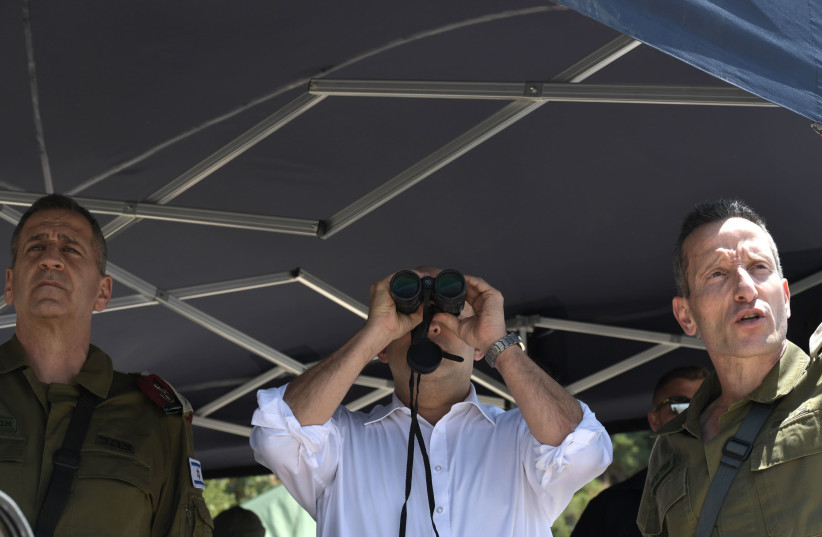The military ombudsman released its annual report of soldiers’ complaints on Wednesday, and detailed claims by service members of abuse, negligence by commanders, inappropriate medical conduct including conduct related to the coronavirus, and more.
The report was written by Brig.-Gen. (res.) Rachel Tevet-Wiesel – who serves as chief complaints officer in the Defense Ministry – and given to Defense Minister Benny Gantz and the Knesset’s Foreign Affairs and Defense Committee.
The ombudsman’s yearly report is based on written complaints that are then investigated with interviews and reviews of internal military reports in order to identify trends within the IDF.
There were a total of 6,222 complaints filed in 2021, an increase of 9% compared to 2020, with a total of 55% found to be justified. Of the total number of complaints, 3,722 were filed by soldiers (an increase of 17% from 2020), 656 by career officers, 491 by reservists and 973 complaints by non-commissioned officers (an increase of 2.5%).
The report found that many of the complaints by soldiers regarding food showed that it is often “of low quality” and that in some units soldiers were limited in the amount of protein they were given and there was no adequate response to troops with allergens or who suffered from celiac disease.

While the complaints mostly centered on physical and verbal abuse, inadequate medical care, bureaucratic inefficiencies and poor living conditions, this year’s report found that 41% of the complaints were about leadership and command as well as physical violence by commanders toward their subordinates.
In one incident, a soldier in mandatory service said that his commanders humiliated him and his fellow soldiers by ordering them to defecate in a glass to prove that they were suffering from upset stomachs. The investigation into the incident found that several soldiers in the unit had been complaining of abdominal pain, vomiting and diarrhea but that there had been some concern that some of the soldiers were “taking advantage” of the situation to get a break from training.
The company commander then gave the troops disposable cups and ordered them to defecate in cups, write their names on the cups and place them in the company’s base. Following the investigation, the commander was tried for his actions.
In another incident, a soldier complained that his company commander had rudely silenced him, pushed him against the wall, strangled him and only stopped after they were physically separated. The investigation found that it was not the officer’s first violent incident.
Another soldier, who serves in an elite unit, complained that his team commander used violent language, did not allow troops to sleep, did not respect medical exemptions, and “conduct that created a complex moral situation for the team,” the report said. Following an investigation into the incident, it was found that the officer also teased troops, imposed collective punishment on them, prevented the troops from taking leave, and treated them in a degrading and discriminatory manner.
The report also dealt with issues surrounding the military’s handling of the coronavirus and stated that there were dozens of complaints by service members who felt pressured by their commanders to get vaccinated, had sanctions imposed on them, or had been discriminated against if they decided not to get vaccinated against COVID-19, contrary to IDF orders.
In one case, female soldiers serving in the Israel Navy complained that following their decision not to get vaccinated they were required to spend five days in quarantine every time they returned from furlough, in contradiction to the Operations Division’s guidelines.
Due to a large number of similar cases, the ombudsman turned to Chief of Staff Lt.-Gen. Aviv Kohavi and clarified that the gap between the guidelines of the navy and Operations Division was “unacceptable” and that they “undermine the trust of troops and creates disorder and severe discrimination.”
Following that, Kohavi instructed the navy to adapt its guidelines to that of the Operations Directorate.
The report also found that commanders, including senior officers, “consciously acted in violation of guidelines and even established procedures intended for their unit only.”
Officers “who clearly act in violation of orders, is serious and can erode the foundation on which the army is founded. It is a problematic example towards IDF soldiers and can do significant damage to public trust,” the report said.
Welcoming the report, the IDF stated that the military is constantly working with additional internal auditing mechanisms to improve its conduct on a wide range of issues and is committed to drawing the necessary lessons from it.
Gantz said that the defense establishment will learn from the report and continue to improve, adding that he “expects commanders to study these reports and take care of things.”
“We need there to be fairness in command, people receive authority [from the IDF]… and they need not exhaust it to the fullest, but should be fair commanders to soldiers,” he said.
Welcoming the report, the IDF stated that the military is constantly working with additional internal auditing mechanisms to improve its conduct on a wide range of issues and is committed to drawing the necessary lessons from it.
“Maintaining the well being of IDF service members, both routinely and in emergencies, is at the forefront of the IDF and therefore there are orders and procedures. Any deviation from these, or negligent or life-threatening conduct, is thoroughly investigated in order to prevent similar cases over the years,” the military said in a statement.
“Cases of discrimination and physical or verbal violence against troops are contrary to IDF values,” it said. “The cases described are extremely serious, especially when commanders commit violence against their subordinates. These are dealt with severely while accompanying the injured troops.”
Kohavi appointed Deputy Chief of Staff Maj.-Gen. Herzi Halevi to address the issues raised in the report.
